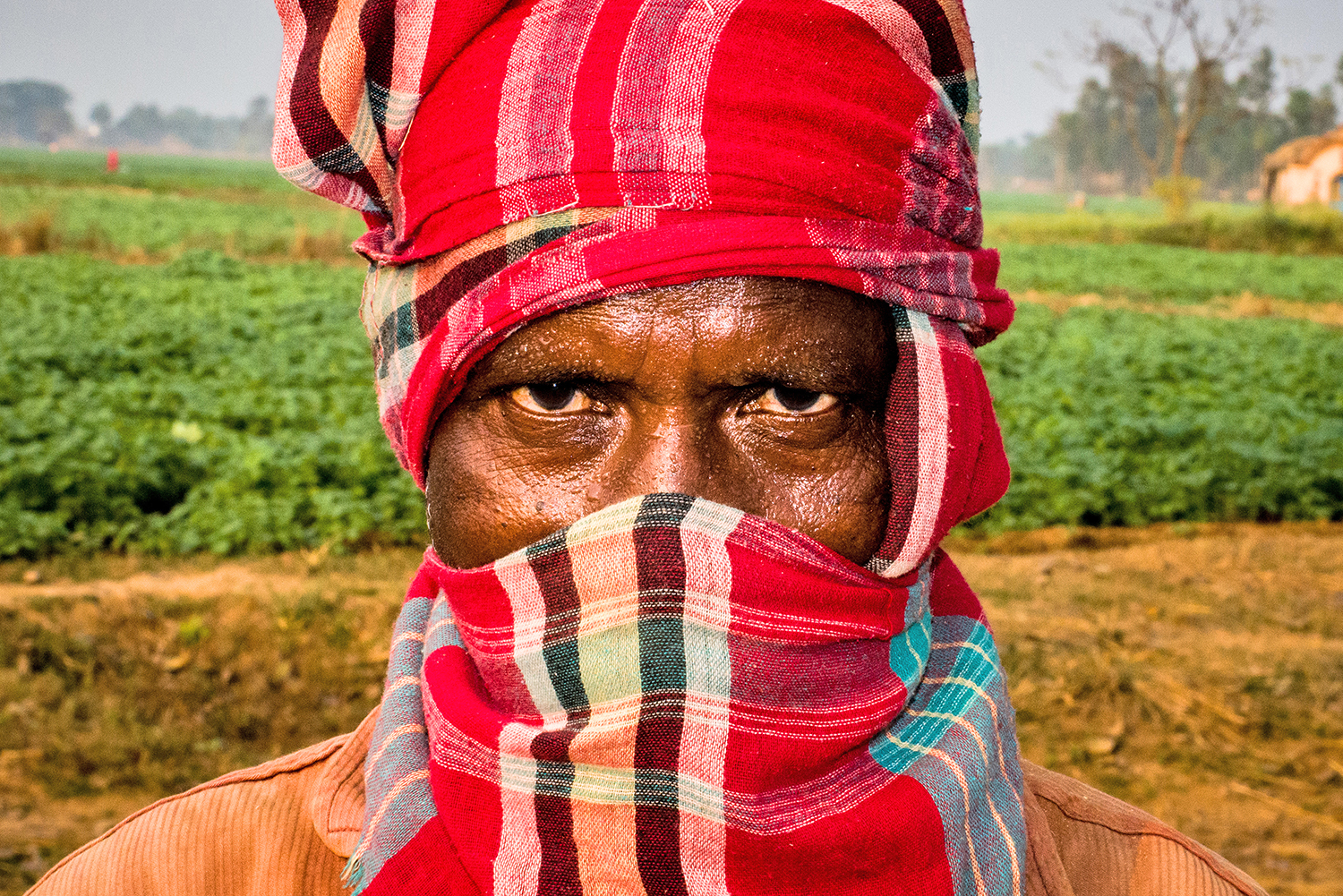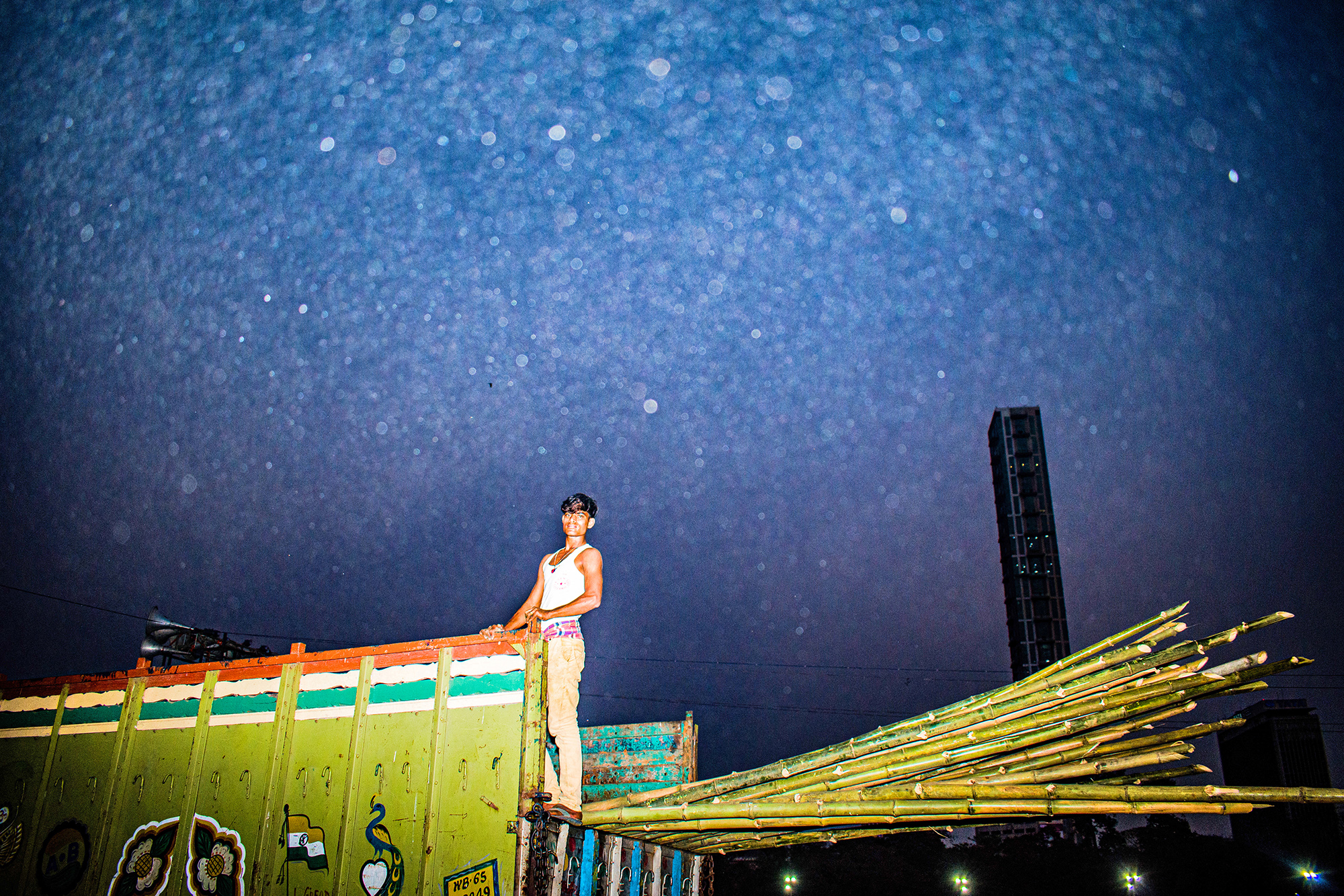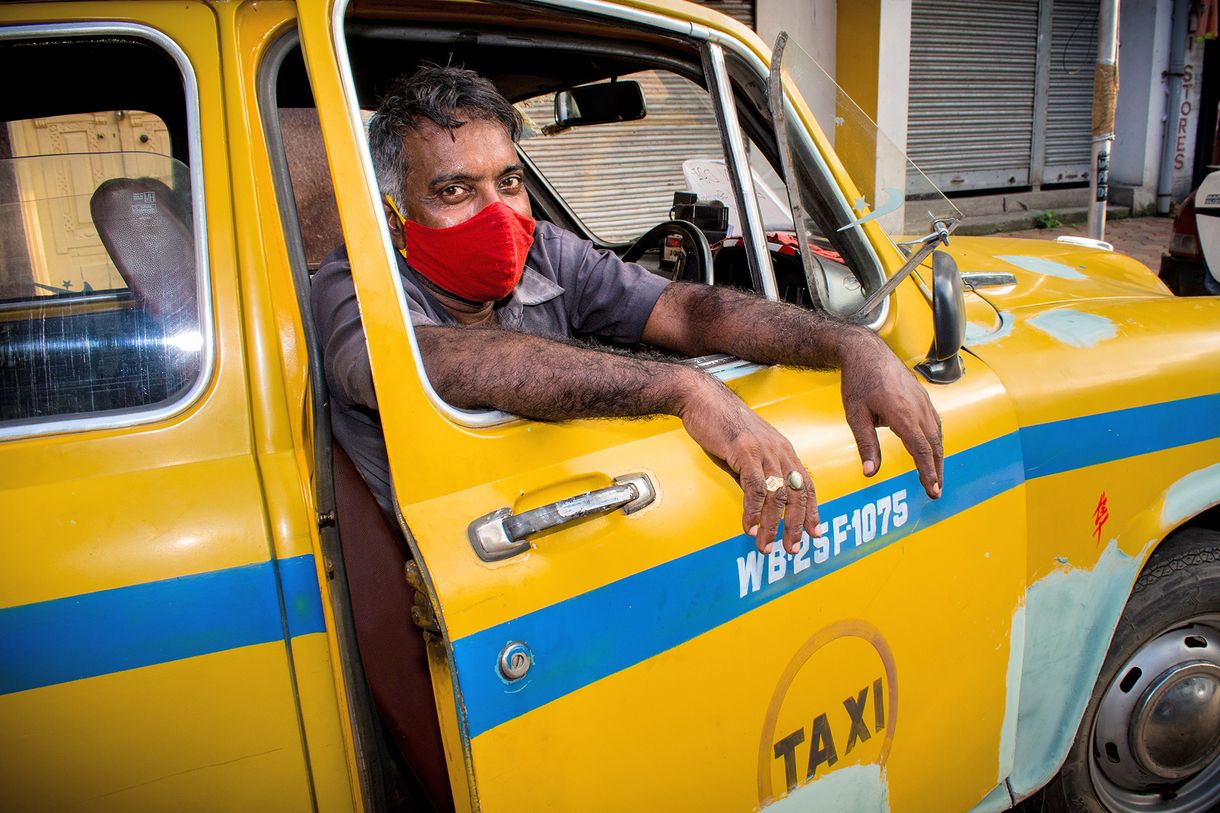This story is very close to my heart.
With these photographs, I have tried to capture the many emotions of migrant workers – their horrendous experiences during the COVID-19 lockdowns in Kolkata, their anxieties about not being able to return home and their never-dying hope.
Many workers from remote, rural areas of Bihar migrate to big cities in West Bengal, Assam and other states in search for livelihood. The pandemic, however, brought many of their lives to a halt as salaries stopped coming in, including for those who work as domestic help. While many migrant workers walked back home, there are many who could not, and had to keep trying to make ends meet.
Heroism, in my opinion, doesn’t always mean an act of bravery. It is also about staying strong during times of crisis and dealing with it head on. In my eyes, all the migrant workers are heroes – they fought hunger and poverty along with the virus.
This is the of story of those heroes.
The birdcatcher

This picture was shot in Kolkata, India. I was out shooting in the street when I noticed this man selling toy parrots. I ducked in the road in order to take a low-angle shot of the man holding the birds and luckily it was the time in the evening where all the birds (especially crows) were returning to their nests. In this picture, I have tried to juxtapose the real birds with the fake ones in his hands. This was taken during the six-month lockdown, at a time when the business of local vendors like this man took a hit.
The street vendor

This picture was taken at an empty bus stand in Kolkata. During normal times, this bus stand in the heart of the city is bustling with noise of the passengers. But due to the lockdown, the area was deserted. I found this man selling balloons on the street, and he told me that he had no choice but continue selling balloons because he couldn’t return to his village.
The migrant worker

This is my personal favourite in this series. The eyes of this brick kiln worker say it all.
The worker at the farms

This picture was taken on the outskirts of Kolkata, where I met this man who works as a farmer. He spoke about his experiences of being stuck in a foreign town without a proper source of income and food.
The labourer

The man is the picture is a labourer, working in an election rally, who has been stuck in the city since the lockdown was announced last year. He was a construction worker, but since the work stopped in the pandemic, he was forced to take up seasonal jobs to earn his daily bread.
The fruit seller

This is Ram Das, a migrant worker from a small town in Bihar, who told me about his hardships during the COVID-19 lockdown in Kolkata, where he had migrated with his family to work as a local fruit seller in a market. This picture was taken in Kolkata, West Bengal near the Esplanade bus stand, where hundreds of workers were waiting and trying just to be on a bus that leaves for Bihar. He told me of how he had been surviving the lockdown with his wife and children and his efforts over many days to try and get back to his hometown.
The factory worker

A shot of an unknown factory worker during the lockdown.
Hope of a father

This old man’s son was a labourer in Kolkata who had migrated from Bihar with his family and had lost his job due to the lockdown. But still, he believed that someday the sun would shine, and their condition will improve. They didn’t give up, and they not only survived the virus but also poverty. During the six-month lockdown, he couldn’t step outside the boundaries of his house, but even then he remained calm and hoped that one day everything will go back to how it was before the pandemic.
The barber

I was walking through the streets of Kolkata when I found a small old fashioned empty barber shop where a barber was sitting. It was the time when lockdown restrictions had just been lifted and people had just started stepping out of their houses. When I spoke to him, he told me how his business was declining day by day due to the pandemic.
The shopkeeper

A shot of a local non-essential shop. Over the past year, India has emerged to be one of the worst affected nations globally by the pandemic, the resultant lockdowns, which are springing up again across the country with the rise in cases. As only the essential services (medicine and grocery) were only allowed to open for a short span of time, the workers of these small shops were the ones who were affected the worst. This is a picture taken before the second wave when the guidelines of the lockdown were a little linear and these shops were given permission to open for a few hours. However, even after opening, these shops suffered huge losses due to fewer customers.
The idol maker

Kumartuli is a traditional potters’ quarter situated in northern Kolkata. The city is renowned for its sculpting prowess. It not only manufactures clay idols for various festivals but also regularly exports them. The second wave has made the artisans of Kumartuli anxious about whether they are going to face the same scenario as last year when Durga Puja organisers ordered smaller, less priced idols to suit their reduced budget induced by the pandemic. Kumartuli supplies idols of gods and goddesses to various parts of the country and abroad and the artisans earn the most during Durga Puja.
This is a photo of Tarun Pal, an idol maker in Kumartuli, who shifted from Odisha to Kolkata to work only to be severely affected by the pandemic. For approximately six months during the lockdown, Pal didn’t work on a single idol, a first in his career as an idol maker. Prior to the coronavirus outbreak, Pal would make approximately 30 small and large idols in one season, ranging from ten feet in height to as small as two feet. This year, however, he has been forced to cut down on that number drastically. Everyone in Kumartuli is facing a similar situation. The costs of the raw materials have increased following the lockdown, leading to an increase in the price of the idols.
The taxi driver

A photo of Adinath Sahu, a taxi driver from Kolkata, who have migrated from a small town in Bihar to work. He is already without income due to the lockdown and finds it very difficult to pay house rent, dues for the vehicle and to meeting expenses for food. His little cash reserves are depleted, and any further extension of the lockdown period is bound to push him and many other taxi drivers like him into desperation. Their fear that the worst is yet to come is not unfounded.
For many, keeping vehicles idle for a stretch for a few weeks has already started causing deterioration in the condition of the battery and other devices. On top of that, the wounds of the previous lockdown itself hadn’t healed. Many taxi drivers are still paying off debts incurred during the previous lockdown in 2020. The government had allowed movement of taxis for emergencies during the lockdown. However, Sahu said it is not feasible to run the taxi depending on those customers. Many taxi drivers have even sold off their cars to make ends meet. Sahu told me that he doesn’t even know how this will end, but everyday he risks his life to earn some money so that he can return home when the lockdown is lifted.
The rickshaw puller

Hand-rickshaw pullers, whose livelihood depends on ferrying people regularly, are facing a pecuniary. This is a photo of a 50-year-old rickshaw puller, Balbir Mahato, who said that a good day would fetch him Rs 300-200, but now making Rs 30 to 40 is a big task. He came to Kolkata from Jharkhand to work as a rickshaw puller nearly two decades ago, but now he cannot go back to his native place as he feels there is no work to be found there. The sole earner of his family, he was anxious about how things would be if the lockdown got extended.
Another rickshaw puller

A photo of another rickshaw puller with the same fate. Babulal Shyam, a 60-year-old from Bihar, whose income more or less dried up, has been struggling to make ends meet. He has to work at this old age also to earn money, and he doesn’t know when he will be able to return to his hometown. Many of the rickshaw pullers do not even own the rickshaws they use, and hire one on rent for Rs 30 per day.
The garage mechanic

A photo of an unknown garage mechanic working during the lockdown. Since most of the garages were closed, he opens his for a short span of time hoping to get some customers, but there are very few and most of the days there are no customers at all due to the restrictions on private vehicles. He hopes that someday things will get better and his business will resume again.
§
These people are among the millions who have been affected by the two waves of the COVID-19 pandemic, but they don’t seem to have bogged down by the circumstances. For them, each and every day is a struggle and a battle to be fought, and they aren’t ready to give up – maybe because there is no other option.
For me, they are heroes – anyone who has had to risk their lives to work and take care of his or her family is a hero. In life we meet so many people, and sometimes we lose touch with them, but it is their stories that stay in our hearts forever.
All photos are by Shubhodeep Roy
Shubhodeep Roy is a 20-year-old award-winning photographer based in Kolkata, India. He is pursuing a Bachelor’s Degree in Commerce from the University Of Calcutta. Photography is his hobby and he started doing it from a very young age, borrowing his uncle’s Nikon D60 camera. His photos have been exhibited in various countries and has been published on multiple occasions nationally and internationally.
